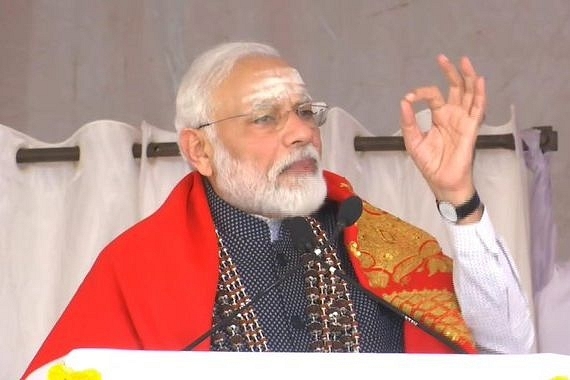Politics
'Karnataka 2023' And Struggle For The 'Civilisational Vote'
- Is the civilisational vote myth or reality, and why is this ideal critical to India's future?

PM Modi at a public meeting in Tumkur, Karnataka (Pic Via Twitter)
The founding fathers of modern Indian State—Jawaharlal Nehru, Mahatma Gandhi, Dr. Ambedkar, Sardar Vallabhai Patel—as also its ideological and organisational visionaries like Veer Savarkar, Moonje, Syama Prasad Mookerjee, all of these personalities agreed upon the civilisational and organic unity of India as a nation.
To them the cultural unity of India was a given.
On the other hand, Dravidianists, Marxists, Islamists and an assorted variety of regional secessionist ideologues along with the British imperialists rejected this organic unity of India.
To them India was merely an artificial creation put together by the British, which post independence became a federation of states.
Of these two views on India, one can rightly be called Hindu, and the other, antithetical to it.
Most Indians, irrespective of party affiliations, consider the former vision - the vision of India's unity as a nation- as true and take it for granted.
Most Indians have also taken it for granted that the Indian National Congress (INC) also stands for and believes in the organic oneness of India as a nation.
This was true to a large extent—until recent years.
Around the UPA era, the party began to dominated by ideologues who believed in the 'contract-nation' theory. They considered India as a creation of the British through force and for administrative necessity first and then as a 'contract-nation' created by the Constitution. Their shallow understanding of Dr. Ambedkar as an 'anti-Hindu' ideologue also helped.
The gradual and eventual consequence of this is that the instruments of the Indian state become more and more hostile to Hinduness of India.
This process was however thwarted with Narendra Modi coming to power in 2014.
Riding on a wave that balances both development and cultural reassertion, he presented an an alternative. He honoured the Constitution and he participated in Shri Ram Mandir bhoomi pujan. His government built toilets, provided basic amenities while he brought back the importance of the memories of Chhatrapathi Shivaji.
In the Modi approach, the Yin and Yang of Hindutva, Gandhi and Savarkar got harmonised.
Rahul Gandhi says that the Constitution never referred to India as a nation. What he does not tell is that the spirit and values embedded in the Constitution repeatedly pronounce India as a nation.
In fact, the Preamble of the Constitution states very clearly when emphasizing the value of fraternity that it assures 'the dignity of the individual and the unity of the Nation'.
The individual starts with lower case and the Nation starts with the upper case. This is not surprising as Dr. Ambedkar had consistently pointed out his 'partiality for a Unitary form of Government' as he felt 'India needs it.' This unitary nature, also embedded in the Constitution, cannot happen in vacuum. It is built on an already existing unity which is the cultural unity of India.
With that established, we come to the question of 'civilizational votes'.
The INC and its leadership has made it clear that elections are not only referenda on governance but also on this deeper nature of India.
This is not a question of rhetoric or academic discussion. This has real life consequences.
Right now the Hindu votes have both dimensions—votes for governance and civilizational votes.
If BJP leaders or supporters consider the governance votes as civilizational then they are mistaken. If a BJP government does not deliver on governance then it loses both for governance and for Indian civilization.
The BJP at state levels should realise this fundamental truth and follow the Modi approach. He never brings in an unnecessary conflict, and yet he brings in cultural assertion. He also brings in development in an unprecedented way. In short, he slowly but unmistakably transforms the votes for governance into civilizational votes.
As against this, most votes against the BJP are clearly a declaration of support for the other view of Indian nationhood—that India is a 'contract-nation' without organic unity.
When it comes to electoral defeats, the Congress loses a state until the next round of polls, but the BJP suffers a debacle in a civilisational conflict.
Narendra Modi understands that this struggle is more than just an electoral contest. The question is—do we?
Introducing ElectionsHQ + 50 Ground Reports Project
The 2024 elections might seem easy to guess, but there are some important questions that shouldn't be missed.
Do freebies still sway voters? Do people prioritise infrastructure when voting? How will Punjab vote?
The answers to these questions provide great insights into where we, as a country, are headed in the years to come.
Swarajya is starting a project with an aim to do 50 solid ground stories and a smart commentary service on WhatsApp, a one-of-a-kind. We'd love your support during this election season.
Click below to contribute.
Latest